初中直接引语变间接引语
- 格式:doc
- 大小:24.50 KB
- 文档页数:10
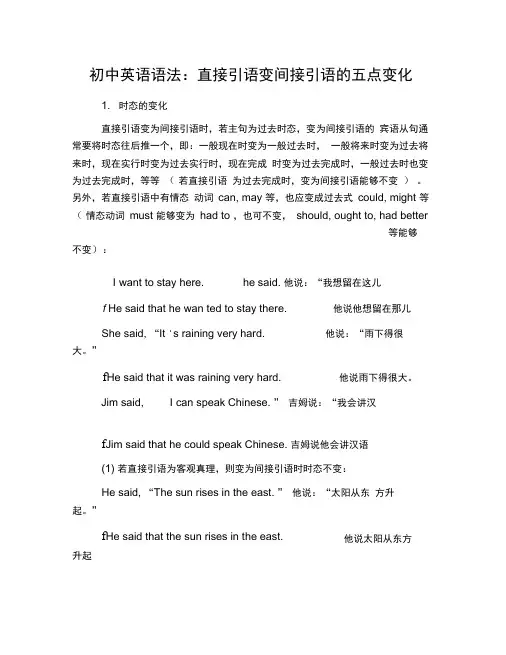
初中英语语法:直接引语变间接引语的五点变化1. 时态的变化直接引语变为间接引语时,若主句为过去时态,变为间接引语的宾语从句通常要将时态往后推一个,即:一般现在时变为一般过去时,一般将来时变为过去将来时,现在实行时变为过去实行时,现在完成时变为过去完成时,一般过去时也变为过去完成时,等等(若直接引语为过去完成时,变为间接引语能够不变)。
另外,若直接引语中有情态动词can, may 等,也应变成过去式could, might 等(情态动词must 能够变为had to ,也可不变,should, ought to, had better等能够不变):I want to stay here. he said. 他说:“我想留在这儿f He said that he wan ted to stay there. 他说他想留在那儿She said, “It 's raining very hard.他说:“雨下得很大。
”f He said that it was raining very hard. 他说雨下得很大。
Jim said, I can speak Chinese. ” 吉姆说:“我会讲汉f Jim said that he could speak Chinese. 吉姆说他会讲汉语(1) 若直接引语为客观真理,则变为间接引语时时态不变:He said, “The sun rises in the east. ” 他说:“太阳从东方升起。
”f He said that the sun rises in the east. 他说太阳从东方升起(2) 有时因为直接引语有特定的过去时间状语,变为间接引语时 时态也可不变:He said, “ was born in 1988. ” 说:“我是 1988 年生的。
”—He said that he was born in 1988.他说他是 1988 年生的。
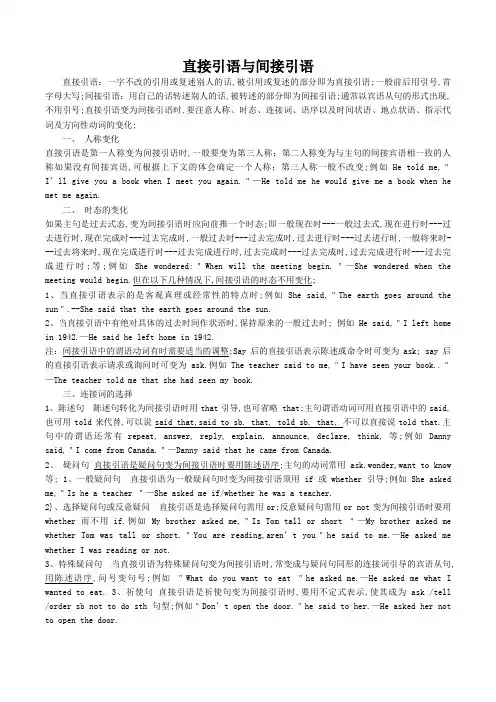
直接引语与间接引语直接引语:一字不改的引用或复述别人的话,被引用或复述的部分即为直接引语;一般前后用引号,首字母大写;间接引语:用自己的话转述别人的话,被转述的部分即为间接引语;通常以宾语从句的形式出现,不用引号;直接引语变为间接引语时,要注意人称、时态、连接词、语序以及时间状语、地点状语、指示代词及方向性动词的变化;一、人称变化直接引语是第一人称变为间接引语时,一般要变为第三人称;第二人称变为与主句的间接宾语相一致的人称如果没有间接宾语,可根据上下文的体会确定一个人称;第三人称一般不改变;例如 He told me,"I’ll give you a book when I meet you again."—He told me he would give me a book when he met me again.二、时态的变化如果主句是过去式态,变为间接引语时应向前推一个时态;即一般现在时---一般过去式,现在进行时---过去进行时,现在完成时---过去完成时,一般过去时---过去完成时,过去进行时---过去进行时,一般将来时---过去将来时,现在完成进行时---过去完成进行时,过去完成时---过去完成时,过去完成进行时---过去完成进行时;等;例如She wondered:"When will the meeting begin."—She wondered when the meeting would begin.但在以下几种情况下,间接引语的时态不用变化;1、当直接引语表示的是客观真理或经常性的特点时;例如 She said,"The earth goes around the sun".--She said that the earth goes around the sun.2、当直接引语中有绝对具体的过去时间作状语时,保持原来的一般过去时; 例如 He said,"I left home in 1942.—He said he left home in 1942.注:间接引语中的谓语动词有时需要适当的调整;Say后的直接引语表示陈述或命令时可变为ask; say后的直接引语表示请求或询问时可变为ask.例如 The teacher said to me,"I have seen your book.."—The teacher told me that she had seen my book.三、连接词的选择1、陈述句陈述句转化为间接引语时用that引导,也可省略 that;主句谓语动词可用直接引语中的said,也可用told来代替,可以说said that,said to sb. that, told sb. that, 不可以直接说told that.主句中的谓语还常有repeat, answer, reply, explain, announce, declare, think, 等;例如Danny said,"I come from Canada."—Danny said that he came from Canada.2、疑问句直接引语是疑问句变为间接引语时要用陈述语序;主句的动词常用ask,wonder,want to know 等; 1、一般疑问句直接引语为一般疑问句时变为间接引语须用if或whether引导;例如 She asked me,"Is he a teacher "—She asked me if/whether he was a teacher.2}、选择疑问句或反意疑问直接引语是选择疑问句需用or;反意疑问句需用or not变为间接引语时要用whether而不用if.例如 My brother asked me,"Is Tom tall or short "—My brother asked me whether Tom was tall or short."You are reading,aren’t you"he said to me.—He asked me whether I was reading or not.3、特殊疑问句当直接引语为特殊疑问句变为间接引语时,常变成与疑问句同形的连接词引导的宾语从句,用陈述语序,问号变句号;例如"What do you want to eat "he asked me.—He asked me what I wanted to eat. 3、祈使句直接引语是祈使句变为间接引语时,要用不定式表示,使其成为 ask /tell /order sb not to do sth 句型;例如"Don’t open the door."he said to her.—He asked her not to open the door.4、感叹句感叹句变为间接引语时可用 what或how引导,也可用that引导;例如 He said,"What a lovely day it is"—He said what a lovely day it was.—He said that it was a lovely day.四、语序的变化当直接引语是疑问句变为间接引语时要用陈述语序,即连接词+主语+动词的形式;例如"Where are you going "he asked me.—He asked me where I was going.但当直接引语中特殊疑问词作主语时,语序不变;例如He asked, “Who is your brother.” -He asked who was my brother.五、时间状语、地点状语、指示代词及方向性动词的变化;now—then today—that day yesterday—the day before last might—the night before two days ago—two days before next week—the next week tomorrow—the next day the day after tomorrow—in two days’time 或者two days after here—there this—that these—those come—go bring—take 例如 He said,"I did my homework yesterday."—He said he had done his homework the day before.六、情态动词的变化can—could must—had to或者must will—would shall—should may—might一、单项选择:1. He asked ________ for the computer.A. did I pay how muchB. I paid how muchC. how much did I payD. how much I paid2. “Have you seen the film” he asked me. →He asked me ________. A. had I seen the film B. have I seen the film C. if I have seen the film D. whether I had seen the film3. “Please close the window,” he said to me. →He ________ me ________ the window.A. said to; to closeB. told to; closingC. asked; to closeD. said to; please close4. “I am a teacher,” Jack said. →He said ________.A. that I am a teacherB. I was a teacherC. that he is a teacherD. he was a teacher5. He said, “Mother, the boy is very naughty.” →He ________ very naughty.A. said his mother that the boy wasB. said to his mother that the boy isC. told his mother that the boy wasD. spoke to his mother that the boy is6. “You’ve already got well, haven’t you” she asked. →She asked ________or not.A. if I have already got well, hadn’t youB. whether I had already got wellC. have I already got wellD. had I already got well7. He asked, “Are you a Party member or a League member”→He asked me ________.A. am I a Party member or a League memberB. was I a Party member or a League memberC. if I was a Party member or a League memberD. whether was I a Party member or a League member8. He asked, “How are you getting along” →He asked ________.A. how am I getting alongB. how are you getting alongC. how I was getting alongD. how was I getting along 9. He asked me ________ with me.A. what the matter isB. what the matter isC. what’s th e matterD. what was wrong10. He said, “Don’t do that again.” →He ________ me ________ that again.A. said to; not to doB. said to; don’t doC. told; don’t doD. told; not to do二、直接引语转换间接引语1. “I saw a note on my desk.” she said.2. Mother said, “I’ll go to the park tomorrow.”3. He said to me, “Your brother broke it.”4. Tom said, “My sister was here three days ago.”5. “We stayed there for two weeks.” she told me.6. She said, “I have given up smoking.”7. “We’ve known each other for about three years.” the young man told him.8. “I haven’t seen her these days.” he said.9. “Mother gave me a new book as a present yesterday.” Mary said.10. “Do you like English or Chinese” the teacher asked me.11. “What did you do yesterday” she asked me.12. “Would you like an apple” mother asked me.13. “Don’t open the door.” she sai d to me.14. “Come here early tomorrow.” the teacher said to us.15. “Did you go to the cinema last night” she asked.16. “Keep the door closed.” the old man said to us.17. “Did you go there by train or by bus” the teacher asked.18. “They are playing on the playground.” Jim said.三、在横线上填上合适的词1. He exclaimed how lovely the house ___________.2. We didn’t know ___________ she hadn’t handed in the paper.3. The monitor ___________ the five of us to clean the floor yesterday afternoon.4. Anderson told us ___________ his father had just returned from Shanghai.5. She ___________ us to help the old woman in our village that day.6. My father asked me ___________ was the matter when he came back.7. That fellow always ___________ me clean his shoes for him.8. Tom said that he ___________ in the army for three years.9. — What did Alice say just now — She said that ___________ would borrow that dictionaryform Mary.10. I wonder ___________ she can attend my party this evening.四、单项选择1. Right now, the boss ordered John to hand in his design ________.A. this afternoonB. this afternoonC. todayD. that day2. Jimmy ________ her if she had seen him there that afternoon. A. said to B. askedC. toldD. ask3. Uncle Wang ordered us to ________ his house at once. A. come out of B. come C. goout of D. go4. The road is covered with snow. I can’t understand ________ they insist on going by motor-bike.A. whyB. whetherC. whenD. how5. Chen Qiang told Mr. Smith that the People’s Republic of China _______ in October 1,1949.A. foundedB. had been foundedC. foundD. was founded6. She said to me that _______ might keep ________ book for two days.A. she; thisB. I; thatC. I; thisD. you; this7. In order to choose the right one, she first asked me _______ I want to use a dictionary for.A. whatB. whyC. howD. whether8. Customers are asked to make sure that they _______ the right change before leaving the shop.A. will giveB. have been givenC. have givenD. will be given9. Linda shouted that you _______ your homework ahead of her.A. finishedB. would finishC. had finishedD. have finished10. My girlfriend asked me _______ I knew it was her birthday that day or not.A. whetherB. thatC. whyD. what五、巩固练习:1、He asked,"Is the door open or closed."He asked _____ _____ _____ _____ _____ _____ _____.2、She said,"I have left my coat in your room."She said _____ _____ _____ _____ _____ ______ ______ ______.3、She said,"I wrote to my friends yesterday."She said _____ _____ _____ _____ _____ _____ ______ ______ _______ ______.4、Mother asked me,"When will you be back next time."Mother asked me_____ _____ _____ _____ _____ _____ _____ _____.5、The teacher told the students,"The earth is round."The teacher told the students_____ _____ _____ _____ _____ .6、The guard said to Lenin,"Please show me your pass."The guard asked Tom_____ _____ _____ _____ _____ .7、Danny said ,"Are you leaving today or tomorrow, Ling Ming "Danny asked Li Ming_____ _____ _____ _____ _____ _____ _____ ______ ______ ______.8、He said ,"My sister was here two days ago, but she is not here now"He said _____ _____ _____ _____ _____ _____ _____ _____, but_____ was not there then.参考答案:一、单项选择1-5 DDCDC BDCDD二、直接引语转换间接引语参考答案1. She said that she had seen a note on her desk.2. Mother said that she would go to the park the next day.3. He told me that my brother had broken it.4. Tom said that hissister had been there three days before. 5. She told me that they had stayed there for two weeks. 6. She said that she had given up smoking. 7. The young man told him that they had known each other for about three years. 8. He said that he hadn’t seen her those days.9. Mary said that her mother had given her a new book as a present the day before. 10. The teacher asked me whether I liked English or Chinese. 11. She asked me what I had done the day before. 12. Mother asked me if/whether I would like an apple. 13. She asked me not to open the door. 14. The teacher told us to go there early the next day. 15. She asked whether/if I had gone to the cinema the night before. 16. The old man told me us to keep the door closed. 17. The teacher asked whether we had gone there by train or by bus.18. Jim said that they were playing on the playground.三、在横线上填上合适的词1. Was2. why/ that3. asked/ ordered4. that5. advised /asked / ordered6. what7.lets / has / makes8. had been / had served9. she 10.if / whether四、单项选择1-5DBCAD 6-10BABCA五、巩固练习:答案:1. if the door was open or closed 2. she had left her coat in my room3. that she had written to her friends the day before 4 .when I would be back the next time 5. that the earth is round 6 .to show him his pass7 .whether he was leaving that day or the next day 8. his sister had been there two days before ,she .。
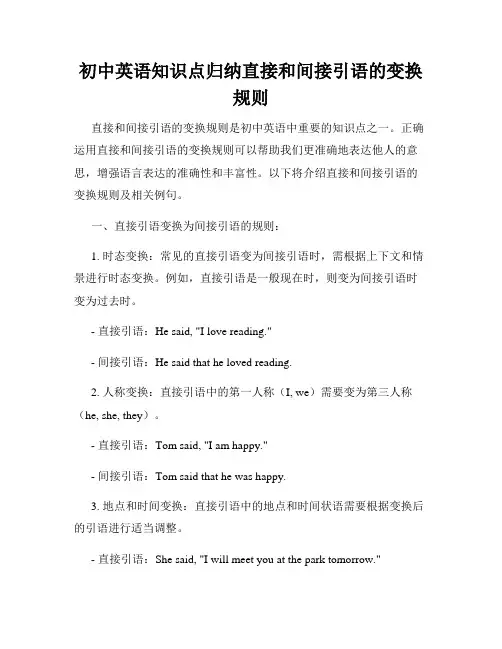
初中英语知识点归纳直接和间接引语的变换规则直接和间接引语的变换规则是初中英语中重要的知识点之一。
正确运用直接和间接引语的变换规则可以帮助我们更准确地表达他人的意思,增强语言表达的准确性和丰富性。
以下将介绍直接和间接引语的变换规则及相关例句。
一、直接引语变换为间接引语的规则:1. 时态变换:常见的直接引语变为间接引语时,需根据上下文和情景进行时态变换。
例如,直接引语是一般现在时,则变为间接引语时变为过去时。
- 直接引语:He said, "I love reading."- 间接引语:He said that he loved reading.2. 人称变换:直接引语中的第一人称(I, we)需要变为第三人称(he, she, they)。
- 直接引语:Tom said, "I am happy."- 间接引语:Tom said that he was happy.3. 地点和时间变换:直接引语中的地点和时间状语需要根据变换后的引语进行适当调整。
- 直接引语:She said, "I will meet you at the park tomorrow."- 间接引语:She said that she would meet me at the park the next day.4. 特殊疑问句的变换:直接引语中的特殊疑问句变为间接引语时,需要用连词“if” 或“whether”引导。
- 直接引语:He asked, "What is your name?"- 间接引语:He asked me what my name was.二、间接引语变换为直接引语的规则:1. 时态变换:间接引语变为直接引语时,需根据上下文和情景进行时态变换。
例如,间接引语是过去时,则变为直接引语时变为一般现在时。
- 间接引语:She told me that she loved reading.- 直接引语:She said, "I love reading."2. 人称变换:间接引语中的第三人称(he, she, they)需要变为第一人称(I, we)。
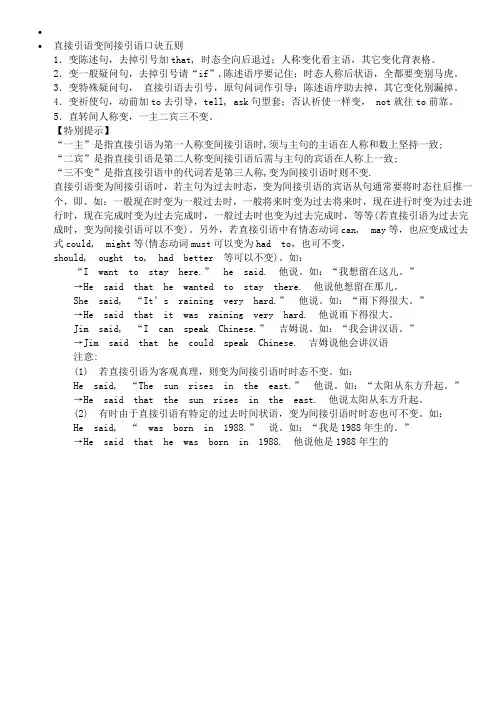
••直接引语变间接引语口诀五则1.变陈述句,去掉引号加that, 时态全向后退过;人称变化看主语,其它变化背表格。
2.变一般疑问句,去掉引号请“if”,陈述语序要记住;时态人称后状语,全都要变别马虎。
3.变特殊疑问句,直接引语去引号,原句问词作引导;陈述语序助去掉,其它变化别漏掉。
4.变祈使句,动前加to去引导,tell, ask句型套;否认祈使一样变, not就往to前靠。
5.直转间人称变,一主二宾三不变。
【特别提示】“一主”是指直接引语为第一人称变间接引语时,须与主句的主语在人称和数上坚持一致;“二宾”是指直接引语是第二人称变间接引语后需与主句的宾语在人称上一致;“三不变”是指直接引语中的代词若是第三人称,变为间接引语时则不变.直接引语变为间接引语时,若主句为过去时态,变为间接引语的宾语从句通常要将时态往后推一个,即。
如:一般现在时变为一般过去时,一般将来时变为过去将来时,现在进行时变为过去进行时,现在完成时变为过去完成时,一般过去时也变为过去完成时,等等(若直接引语为过去完成时,变为间接引语可以不变)。
另外,若直接引语中有情态动词can, may等,也应变成过去式could, might等(情态动词must可以变为had to,也可不变,should, ought to, had better 等可以不变)。
如:“I want to stay here.”he said. 他说。
如:“我想留在这儿。
”→He said that he wanted to stay there. 他说他想留在那儿。
She said, “It’s raining very hard.”他说。
如:“雨下得很大。
”→He said that it was raining very hard. 他说雨下得很大。
Jim said, “I can speak Chinese.”吉姆说。
如:“我会讲汉语。
”→Jim said that he could speak Chinese. 吉姆说他会讲汉语注意:(1) 若直接引语为客观真理,则变为间接引语时时态不变。
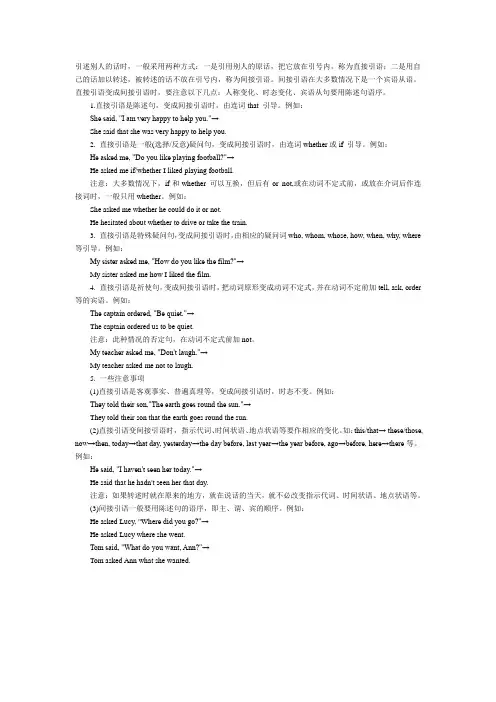
引述别人的话时,一般采用两种方式:一是引用别人的原话,把它放在引号内,称为直接引语;二是用自己的话加以转述,被转述的话不放在引号内,称为间接引语。
间接引语在大多数情况下是一个宾语从语。
直接引语变成间接引语时,要注意以下几点:人称变化、时态变化、宾语从句要用陈述句语序。
1.直接引语是陈述句,变成间接引语时,由连词that 引导。
例如:She said, "I am very happy to help you."→She said that she was very happy to help you.2. 直接引语是一般(选择/反意)疑问句,变成间接引语时,由连词whether或if 引导。
例如:He asked me, "Do you like playing football?"→He asked me if/whether I liked playing football.注意:大多数情况下,if和whether 可以互换,但后有or not,或在动词不定式前,或放在介词后作连接词时,一般只用whether。
例如:She asked me whether he could do it or not.He hesitated about whether to drive or take the train.3. 直接引语是特殊疑问句,变成间接引语时,由相应的疑问词who, whom, whose, how, when, why, where 等引导。
例如:My sister asked me, "How do you like the film?"→My sister asked me how I liked the film.4. 直接引语是祈使句,变成间接引语时,把动词原形变成动词不定式,并在动词不定前加tell, ask, order 等的宾语。
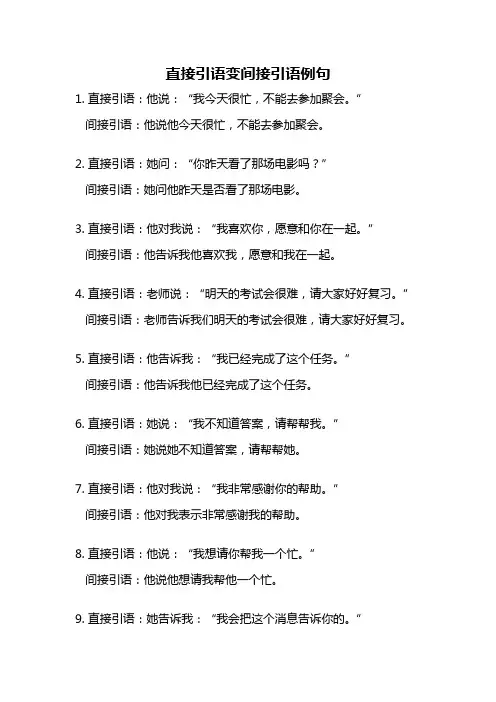
直接引语变间接引语例句
1. 直接引语:他说:“我今天很忙,不能去参加聚会。
”
间接引语:他说他今天很忙,不能去参加聚会。
2. 直接引语:她问:“你昨天看了那场电影吗?”
间接引语:她问他昨天是否看了那场电影。
3. 直接引语:他对我说:“我喜欢你,愿意和你在一起。
”
间接引语:他告诉我他喜欢我,愿意和我在一起。
4. 直接引语:老师说:“明天的考试会很难,请大家好好复习。
”间接引语:老师告诉我们明天的考试会很难,请大家好好复习。
5. 直接引语:他告诉我:“我已经完成了这个任务。
”
间接引语:他告诉我他已经完成了这个任务。
6. 直接引语:她说:“我不知道答案,请帮帮我。
”
间接引语:她说她不知道答案,请帮帮她。
7. 直接引语:他对我说:“我非常感谢你的帮助。
”
间接引语:他对我表示非常感谢我的帮助。
8. 直接引语:他说:“我想请你帮我一个忙。
”
间接引语:他说他想请我帮他一个忙。
9. 直接引语:她告诉我:“我会把这个消息告诉你的。
”
间接引语:她告诉我她会把这个消息告诉我。
10. 直接引语:他说:“我不知道明天天气怎么样。
”间接引语:他说他不知道明天天气怎么样。
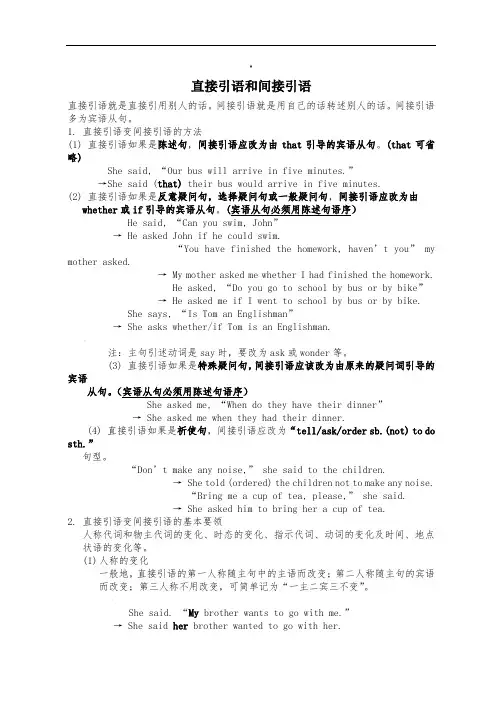
#直接引语和间接引语直接引语就是直接引用别人的话。
间接引语就是用自己的话转述别人的话。
间接引语多为宾语从句。
1. 直接引语变间接引语的方法(1) 直接引语如果是陈述句,间接引语应改为由that引导的宾语从句。
(that可省略)She said, “Our bus will arrive in five minutes.”→She said (that) their bus would arrive in five minutes.(2) 直接引语如果是反意疑问句,选择疑问句或一般疑问句,间接引语应改为由whether或if引导的宾语从句。
(宾语从句必须用陈述句语序)He said, “Can you swim, John”→ He asked John if he could swim.“You have finished the homework, haven’t you” my mother asked.→ My mother asked me whether I had finished the homework.He asked, “Do you go to school by bus or by bike”→ He asked me if I went to school by bus or by bike.She says, “Is Tom an Englishman”→ She asks whether/if Tom is an Englishman.、注:主句引述动词是say时,要改为ask或wonder等。
(3) 直接引语如果是特殊疑问句,间接引语应该改为由原来的疑问词引导的宾语从句。
(宾语从句必须用陈述句语序)She asked me, “When do they have their dinner”→ She asked me when they had their dinner.(4) 直接引语如果是祈使句,间接引语应改为“tell/ask/order sb.(not) to do sth.”句型。
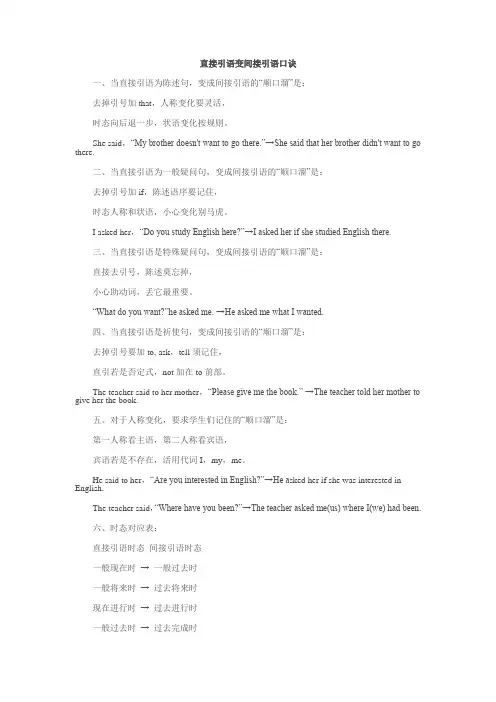
直接引语变间接引语口诀一、当直接引语为陈述句,变成间接引语的“顺口溜”是:去掉引号加that,人称变化要灵活,时态向后退一步,状语变化按规则。
She said,“My brother doesn't want to go there.”→She said that her brother didn't want to go there.二、当直接引语为一般疑问句,变成间接引语的“顺口溜”是:去掉引号加if,陈述语序要记住,时态人称和状语,小心变化别马虎。
I asked her,“Do you study English here?”→I asked her if she studied English there.三、当直接引语是特殊疑问句,变成间接引语的“顺口溜”是:直接去引号,陈述莫忘掉,小心助动词,丢它最重要。
“What do you want?”he asked me. →He asked me what I wanted.四、当直接引语是祈使句,变成间接引语的“顺口溜”是:去掉引号要加to, ask,tell须记住,直引若是否定式,not加在to前部。
The teacher said to her mother,“Please give me the book.” →The teacher told her mother to give her the book.五、对于人称变化,要求学生们记住的“顺口溜”是:第一人称看主语,第二人称看宾语,宾语若是不存在,活用代词I,my,me。
He said to her,“Are you interested in English?”→He a sked her if she was interested in English.The teacher said,“Where have you been?”→The teacher asked me(us) where I(we) had been.六、时态对应表:直接引语时态间接引语时态一般现在时→ 一般过去时一般将来时→ 过去将来时现在进行时→ 过去进行时一般过去时→ 过去完成时现在完成时→ 过去完成时(过去完成时时态不变)情态动词也要变成相应的过去式:can could; may might; must must/had to一般疑问句whether/if 引导的宾语从句“Is this your umbrella, Mary?” asked John.John asked Mary if that was her umbrella.特殊疑问句wh-词引导的宾语从句“Mary, when will you return John asked Mary when she wouldme the book?” asked John return him the book主句动词为一般现在时或现在完成时从句动词时态不变She often says, “All men and women She often says that all men and womenar e equal under the law.”are equal under the law.主句动词为一般过去时一般现在时一般过去时“I know it,” he said.He said that he knew it现在进行时过去进行时“I’m making coffee for you all,” she said.She said she was making coffee for us all.现在完成时过去完成时“I have seen her before,” said he. He said he had seen her before.一般过去时过去完成时“I saw her last Monday,” he said.He said he had seen her the previous Monday过去完成时过去完成时“ Do you know Rick had been ill in bed.Jack asked if I knew Rick had been ill in bedfor many days till he died?” Jack asked for many days till he died一般将来时过去将来时He said: “We shall start tomorrow He said they would start the next day由直接引语转变为间接引语,下列情况时态不变:1. 不变的真理The teacher said to the students, “Water freezes when the temperature falls below 0℃.”→ The teacher told the students that water freezes when the temperature falls below 0℃.2. 经常的习惯:He said to the doctor, “I smoke two packs every day.”→ He told the doctor that he smokes two packs every day.3. 历史事件:The teacher said, “World War Ⅱended in 1945.”→ The teacher said that World War Ⅱ ended in 1945.4. 部分情态动词,如must, ought to, used to, had better等:She said to me: “You must hurry up.”→ She said that I must hurry up.练习题;1. Jack said to me, “You look worried today.”Jack told me that ___ worried ___.A. he looks…todayB. you look…todayC. we looked…that dayD. I looked…that day2. We said to her, “They’re walking through the street now.”We told her that ___ through the street ___.A. we were walking…thenB. you are walking…nowC .they were walking…then D. they walking…now3. Mr Black said, “I have walked a long way this week.”Mr Black said that __ a long way __.A. I had walked…last wee kB. he had walked…that weekC. I walked…last weekD. he has walked…this week4. The man thought, “I shall take it back tomorrow.”The man thought that __ take it back ____.A. I shall…tomorrowB. I shall…the next dayC. he should…tomo rrowD. he wo uld …the next day5. They said to us, “Are you afraid to leave this house ?”They asked us ____ afraid to leave _____ house.A. that were we…thisB. that we were…thatC. if were we …thisD. if we were…that6. Jane said, “What did he hear about a week ago?”Jane asked ____ about _____.A. that he heard…a week ag oB. what he had heard…the week beforeC. what he had herd… a week agoD. if he heard…the week ago7. She asked, “Whose house will he break into next time ?”She asked whose house ____ break into __A. will he…next timeB. would he…the next timeC. he would…the next timeD. he will…next time8. Jack said to her, “Where do you spend your holidays?”Jack asked her where ____ holidays.A. she spent herB. you spend yourC. she spend herD. you spent your9. Black asked me, “ Why haven’t you left here yet?”Black asked me why ____ yet.A. I hadn’t left thereB. I haven’t left hereC. hadn’t I left thereD. haven’t I lef t here10. The teacher asked her, “Does the sun rise in the east ?”The teacher asked her ___ the sun ___ in the east.A. if…riseB. if…risesC. whether…roseD. whether did …rise。
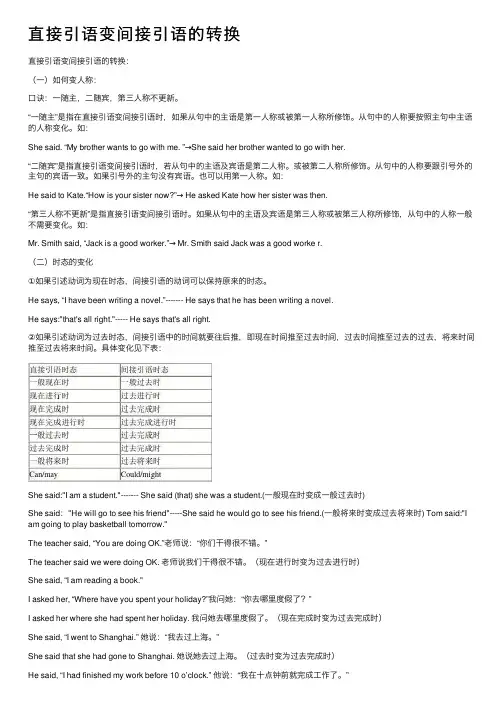
直接引语变间接引语的转换直接引语变间接引语的转换:(⼀)如何变⼈称:⼝诀:⼀随主,⼆随宾,第三⼈称不更新。
“⼀随主”是指在直接引语变间接引语时,如果从句中的主语是第⼀⼈称或被第⼀⼈称所修饰。
从句中的⼈称要按照主句中主语的⼈称变化。
如:She said. “My brother wants to go with me. ”→She said her brother wanted to go with her.“⼆随宾”是指直接引语变间接引语时,若从句中的主语及宾语是第⼆⼈称。
或被第⼆⼈称所修饰。
从句中的⼈称要跟引号外的主句的宾语⼀致。
如果引号外的主句没有宾语。
也可以⽤第⼀⼈称。
如:He said to Kate.“How is your sister now?”→ He asked Kate how her sister was then.“第三⼈称不更新”是指直接引语变间接引语时。
如果从句中的主语及宾语是第三⼈称或被第三⼈称所修饰,从句中的⼈称⼀般不需要变化。
如:Mr. Smith said, “Jack is a good worker.”→ Mr. Smith said Jack was a good worke r.(⼆)时态的变化①如果引述动词为现在时态,间接引语的动词可以保持原来的时态。
He says, “I have been writing a novel.”------- He says that he has been writing a novel.He says:"that's all right."----- He says that's all right.②如果引述动词为过去时态,间接引语中的时间就要往后推,即现在时间推⾄过去时间,过去时间推⾄过去的过去,将来时间推⾄过去将来时间。
具体变化见下表:She said:"I am a student."------- She said (that) she was a student.(⼀般现在时变成⼀般过去时)She said:"He will go to see his friend"-----She said he would go to see his friend.(⼀般将来时变成过去将来时) Tom said:"I am going to play basketball tomorrow."The teacher said, “You are doing OK.”⽼师说:“你们⼲得很不错。
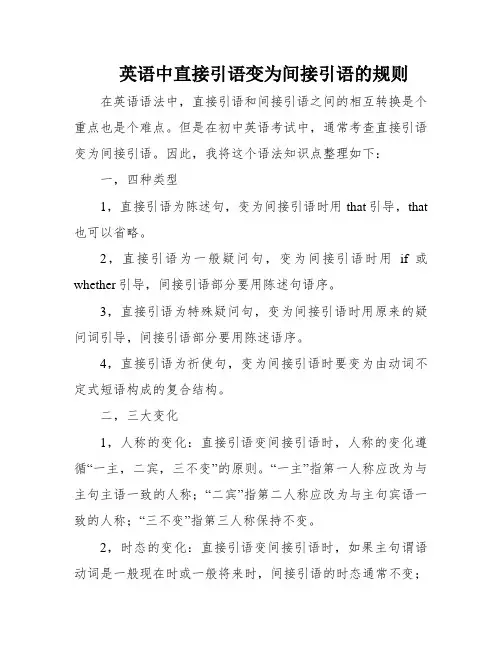
英语中直接引语变为间接引语的规则在英语语法中,直接引语和间接引语之间的相互转换是个重点也是个难点。
但是在初中英语考试中,通常考查直接引语变为间接引语。
因此,我将这个语法知识点整理如下:一,四种类型
1,直接引语为陈述句,变为间接引语时用that引导,that 也可以省略。
2,直接引语为一般疑问句,变为间接引语时用if或whether引导,间接引语部分要用陈述句语序。
3,直接引语为特殊疑问句,变为间接引语时用原来的疑问词引导,间接引语部分要用陈述语序。
4,直接引语为祈使句,变为间接引语时要变为由动词不定式短语构成的复合结构。
二,三大变化
1,人称的变化:直接引语变间接引语时,人称的变化遵循“一主,二宾,三不变”的原则。
“一主”指第一人称应改为与主句主语一致的人称;“二宾”指第二人称应改为与主句宾语一致的人称;“三不变”指第三人称保持不变。
2,时态的变化:直接引语变间接引语时,如果主句谓语动词是一般现在时或一般将来时,间接引语的时态通常不变;
若主句谓语动词是一般过去时,间接引语常变成相应的过去时态。
即:一般现在时变为一般过去时;现在进行时变为过去进行时;一般将来时变为过去将来时;一般过去时变为过去完成时;若转述的内容为客观真理,时态则不变。
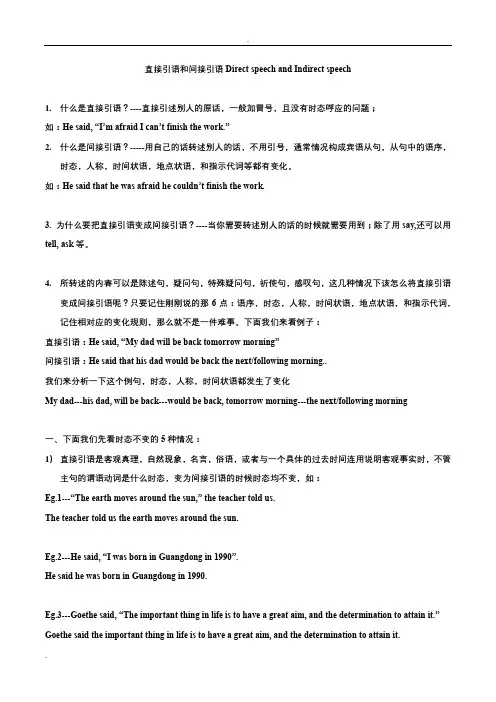
直接引语和间接引语Direct speech and Indirect speech1.什么是直接引语?----直接引述别人的原话,一般加冒号,且没有时态呼应的问题;如:He said, “I’m afraid I can’t finish the work.”2.什么是间接引语?-----用自己的话转述别人的话,不用引号,通常情况构成宾语从句,从句中的语序,时态,人称,时间状语,地点状语,和指示代词等都有变化。
如:He said that he was afraid he couldn’t finish the work.3. 为什么要把直接引语变成间接引语?----当你需要转述别人的话的时候就需要用到;除了用say,还可以用tell, ask等。
4.所转述的内容可以是陈述句,疑问句,特殊疑问句,祈使句,感叹句,这几种情况下该怎么将直接引语变成间接引语呢?只要记住刚刚说的那6点:语序,时态,人称,时间状语,地点状语,和指示代词,记住相对应的变化规则,那么就不是一件难事。
下面我们来看例子:直接引语:He said, “My dad will be back tomorrow morning”间接引语:He said that his dad would be back the next/following morning..我们来分析一下这个例句,时态,人称,时间状语都发生了变化My dad---his dad, will be back---would be back, tomorrow morning---the next/following morning一、下面我们先看时态不变的5种情况:1)直接引语是客观真理,自然现象,名言,俗语,或者与一个具体的过去时间连用说明客观事实时,不管主句的谓语动词是什么时态,变为间接引语的时候时态均不变,如:Eg.1---“The earth moves around the sun,” the teacher told us.The teacher told us the earth moves around the sun.Eg.2---He said, “I was born in Guangdong in 1990”.He said he was born in Guangdong in 1990.Eg.3---Goethe said, “The important thing in life is to have a great aim, and the determination to attain it.”Goethe said the important thing in life is to have a great aim, and the determination to attain it.Eg.4:He said, “Practice makes perfect.”He said that practice makes perfect.2)主句的谓语动词是现在是或将来时,变成间接引语时时态不变Eg.1---He says, “I finished the work.”He says he finished the work.Eg.2---He will say, “I have watered the flower.”He will say he has watered the flower.Eg.3---He will say, “I will try my best to help you.”He will say he will try his best to help me.3)直接引语如果是一般现在时,表示反复出现或习惯性动作,变为间接引语时时态不变。
.直接引语和间接引语概述1. 我们把引述别人的话语可归纳为两种方式,一种时直接引述别人的话语,并置于引号之内的称为直接引语,另一种是用自己的语言转述别人的话语,称为间接引语,间接一般构成宾语从句。
The girl said, “I like English very much.” 那个女孩说:“我非常喜欢英语。
”(直接引语)The girl said that she liked English very much. 那个女孩说她非常喜欢英语。
(间接引语)2. 一般在直接引语或间接引语当中都有一个引述动词,如tell, ask, say 等。
这些引述动词和它们的主语所放位置比较灵活,可以放在直接引语之前、之后或其中。
主语如果是名词时,可以倒装。
“主语+引述动词”放在间接引语当中就相当于宾语从句的主语部分。
He told me, “I am going to Changchun tomorrow.” 他告诉我:“明天我打算去长春。
”“Where are you from?” asked Linda. “你来自哪里?”琳达问。
二.直接引语变间接引语的变化形式1. 人称代词和指示代词的变化指示代词this 和these通常变为that和those 。
人称代词也要根据情况做适当调整。
从句中的第一人称多变为第三人称,第二人称根据情况改为第一人称或第三人称,第三人称不变。
例如:He said, “I came to help you.” 他说:“我是来帮助你的。
”→He said that he had come to help me. 他说他是来帮助我的。
2. 时态的变化(1)引述动词如果用一般现在时或一般将来时,间接引语的时态不变。
(2)引述动词如果用一般过去时,间接引语的时态要变成相应的过去时态的一种。
具体变化如下:一般现在时→一般过去时一般过去时→过去完成时现在进行时→过去进行时现在完成时→过去完成时一般将来时→过去将来时【注意】(1)含有情态动词的直接引语变成间接引语是,情态动词也要相应地变成过去时态。
直接引语变间接引语(超级经典归纳)直接引语变间接引语(宾语从句)一.直接引语和间接引语的定义。
直接引语:直接引用别人的话叫直接引语。
间接引语:用自己的话转述别人的话叫间接引语。
直接引语前后加引号;间接引语不必加引号。
He said,“ I’m a student.”(直接引语)→XXX.(间接引语)主句从句主句从句二.当直接引语为特殊疑问句变间接引语形成宾语从句时,首先要注意用特殊疑问词。
其后用陈述语序的句子,同时注意人称、时态、时间状语,连接词,语序的变化.(一)人称的变化规则:一随主,二随宾,第三人称不更新。
一随主二随宾三不用变引号内的第一人称变间引后与主句主语的人称保持一致引号内的第二人称变间引后与主句宾语的人称保持一致引号内的第三人称在变间引后去人称稳定He says,”Ilike math very much。
→XXX。
He said to Lily,“you must get。
up early”→He told Lily that。
she must get up。
earlyShe said to me。
“They want to help him”→She told me that。
they wanted。
help him★(二).时态变化宾语从句时态变化规则:主现从不限;主过从四过(即4种过去的时态:一般过去时;过去进行时;过去将来时;过去完成时);客观真理,只用一般现在时。
1.主句普通目前时,从句可用随便时态。
2.主句曩昔时,从句用响应的曩昔时态。
即普通目前时改成普通曩昔时;目前举行时改成曩昔举行时;普通未来时改成曩昔未来时;普通曩昔时、目前完成时、曩昔完成时改成曩昔完成时。
3.主句过去时,从句是客观真理时,只用一般现在时。
XXX us:" XXX."XXX.主句的时态从句的时态例句一般现在时所需的任何时态He says,”XXX。
He says→He says that he likes math very much直接引语间接引语一般现在时一般过去时He said。
直接引语转换为间接引语的技巧引述某人的话一般接受两种形式:一种是直接引语,即原封不动地引用原话,把它放在引号内;另一种是间接引语,即用自己的话加以转述,被转述的内容不放在引号内。
下面我们一起来学习几种直接引语转换为间接引语的技巧。
一、人称的转换1. 直接引语中的第一人称,一般转换为第三人称如:He said,“I am very sorry.”→He said that he was very sorry.2. 直接引语中的第二人称,假如原话是针对转述人说的,应转换为第一人称如:“You should be more careful next time.”my father told me.→ My father told me that I should be more careful the next time.3. 直接引语中的第二人称,假如原话是针对第三人称说的,要转换成第三人称如:She said to her son,“I’ll check your homework tonight.”→ She said to her son that she would check his homework that night.4. 人称的转换包括人称代词、物主代词和名词性物主代词等如:He asked me,“Will you go to the station with me to meet a friend of mine this afternoon?”→He asked me whether I would go to the station with him to meeta friend of his that afternoon.5. 口诀巧记人称转变口诀:“一主、二宾、三不变”。
〔1〕“一主”指当直接引语中的第一人称变为间接引语时,要和主句中的主语在人称上保持一致。
如:He said,“I am forty.”→ He said that he was forty.〔2〕“二宾”指当直接引语中的第二人称变为间接引语时,要和主句中的间接宾语保持人称上的一致。
直接引语和间接引语Direct speech and Indirect speech1.什么是直接引语?----直接引述别人的原话,一般加冒号,且没有时态呼应的问题;如:He said, “I’m afraid I can’t finish the work.”2.什么是间接引语?-----用自己的话转述别人的话,不用引号,通常情况构成宾语从句,从句中的语序,时态,人称,时间状语,地点状语,和指示代词等都有变化。
如:He said that he was afraid he couldn’t finish the work.3. 为什么要把直接引语变成间接引语?----当你需要转述别人的话的时候就需要用到;除了用say,还可以用tell, ask等。
4.所转述的内容可以是陈述句,疑问句,特殊疑问句,祈使句,感叹句,这几种情况下该怎么将直接引语变成间接引语呢?只要记住刚刚说的那6点:语序,时态,人称,时间状语,地点状语,和指示代词,记住相对应的变化规则,那么就不是一件难事。
下面我们来看例子:直接引语:He said, “My dad will be back tomorrow morning”间接引语:He said that his dad would be back the next/following morning..我们来分析一下这个例句,时态,人称,时间状语都发生了变化My dad---his dad, will be back---would be back, tomorrow morning---the next/following morning一、下面我们先看时态不变的5种情况:1)直接引语是客观真理,自然现象,名言,俗语,或者与一个具体的过去时间连用说明客观事实时,不管主句的谓语动词是什么时态,变为间接引语的时候时态均不变,如:Eg.1---“The earth moves around the sun,” the teacher told us.The teacher told us the earth moves around the sun.Eg.2---He said, “I was born in Guangdong in 1990”.He said he was born in Guangdong in 1990.Eg.3---Goethe said, “The important thing in life is to have a great aim, and the determination to attain it.”Goethe said the important thing in life is to have a great aim, and the determination to attain it.Eg.4:He said, “Practice makes perfect.”He said that practice makes perfect.2)主句的谓语动词是现在是或将来时,变成间接引语时时态不变Eg.1---He says, “I finished the work.”He says he finished the work.Eg.2---He will say, “I have watered the flower.”He will say he has watered the flower.Eg.3---He will say, “I will try my best to help you.”He will say he will try his best to help me.3)直接引语如果是一般现在时,表示反复出现或习惯性动作,变为间接引语时时态不变。
“直接引语和间接引语”一、直接引语和间接引语概述He told me, “I am going to Changchun tomorrow.” 他告诉我:“明天我打算去长春。
”“Where are you from?” asked Linda. “你来自哪里?”琳达问。
二、直接引语变间接引语的变化形式1、人称代词和指示代词的变化指示代词this 和these通常变为that和those 。
人称代词也要根据情况做适当调整。
从句中的第一人称多变为第三人称,第二人称根据情况改为第一人称或第三人称,第三人称不变。
例如:He said, “I came to help you.” 他说:“我是来帮助你的。
”→He said that he had come to help me. 他说他是来帮助我的。
2、时态的变化引述动词如果用一般现在时或一般将来时,间接引语的时态不变。
引述动词如果用一般过去时,间接引语的时态要变成相应的过去时态的一种。
具体变化如下:一般现在时→一般过去时一般过去时→过去完成时现在进行时→过去进行时现在完成时→过去完成时一般将来时→过去将来时【注意】含有情态动词的直接引语变成间接引语是,情态动词也要相应地变成过去时态。
若直接引语为客观真理或自然规律,变为间接引语时,时态不变。
有时由于直接引语有特定的过去时间状语,变为间接引语时,时态不变。
3、时间状语的变化now → then last month → the month beforetoday → that day three days ago → three days beforetonight → that night tomorrow → the next daythis week → that week next month → the next monthyesterday → the day before the day after tomorrow → in two days4、地点状语的变化here → there谓语动词的变化come → go三.直接引语变为间接引语的情况1、直接引语为陈述句(1)将直接引语变为由that 引导的宾语从句,接在谓语动词之后(that 可以省略)。
例如:He said, “I forgot to call you yesterday.”他说:“我昨天忘记给你打电话了。
”→He said that he had forgotten to call me the day before.他说她前一天忘记给我打电话了。
(2)如果引述动词是say to sb.,则通常改为tell sb. sth. 结构。
例如:He said to me, “Your bike is broken.” 她对我说:“你的自行车坏了。
”→He told me that my bike was broken. 他对我说我的自行车坏了。
2、直接引语为一般疑问句直接引语为一般疑问句,将直接引语变为由if /whether 引导的宾语从句,句中时态、人称、指示代词、时间状语、地点状语等要做相应的变化。
其语序为陈述语序,若直接引语的引述动词为say ,应改为ask. 例如:Mary asked me, “Is Helen from the United States?” 玛丽问我,“凯伦时美国人吗?”→Mary asked me whether/if Helen was from the United States. 玛丽问我海伦是否时美国人。
直接引语为特殊疑问句直接引语为特殊疑问句,将直接引语变为由特殊疑问句引导的宾语从句,语序是陈述语序。
例如:John asked me, “Where does Zhou Xun come from?”约翰问我,“周迅是哪儿的人?”→John asked me where Zhou Xun came from. 约翰问我周迅时哪儿的人。
四、直接引语变间接引语自主检测试题(一)将所给直接引语变为间接引语,每空一词:1.“I never eat meat.” he said.He said that ______ never ______ meat.2.“I’ve found my wallet.” he said to me.He ______ me that he ______ ______ ______ wallet.3.“I took it home with me.” she said.She said that ______ ______ _______ it home with her.4.The teacher said, “The sun rises in the east and goes down in the west.”The teacher said that the sun ______ in the east and ______ down in the west.5.“I met her yesterday.” he said to me.He ______ me that he ______ met the day ______.6.“You must come here before five.” he said.He said that I ______ to go ______ before five.7.“I bought the house 10 years ago.” he said.He said that he _______ bought the house 10 years _______.8.“Did you see her last week?” he said.He ______ ______ I had seen her the week _______.9.He said, “You can sit here, Jim.”He ______ Jim that he ______ sit there10.He asked, “How did you find it, mother?”He asked her mother ______ ______ ______ found it.11.“Where have you been these days?” he asked.He asked me _______ _______ _______been _______ days. 12.“Do you know where she lives?” he asked.He asked ______ ______ knew where she ______.13.“Stop making so much noise, children.” he said.He ______ the children ______ ______ making so much noise.14.“Don’t tell him the news.” she said.She told me _______ ______ ______ him the news.15.“Are you intested in this?” he said.He ______ ______ I was interestd in ______.(二)直接引语与间接引语转化巩固练习A、在横线上填上合适的词1. He exclaimed how lovely the house ___________.2. We didn’t know ___________ she hadn’t handed in the paper.3. The monitor ___________ the five of us to clean the floor yesterday afternoon.4. Anderson told us ___________ his father had just returned from Shanghai.5. She ___________ us to help the old woman in our village that day.6. My father asked me ___________ was the matter when he came back.7. That fellow always ___________ me clean his shoes for him.8. Tom said that he ___________ in the army for three years.9. — What did Alice say just now?— She said that ___________ would borrow that dictionary form Mary.10. I wonder ___________ she can attend my party this evening.B、单项选择1. Right now, the boss ordered John to hand in his design ________.A. this afternoonB. that afternoonC. that momentD. that day2. Jimmy ________ her if she had seen him there that afternoon.A. said toB. askedC. toldD. asks3. Uncle Wang ordered us to ________ his house at once.A. come out ofB. comeC. go out ofD. go4. The road is covered with snow. I can’t understand ________ they insist on going by motor-bike.A. whyB. whetherC. whenD. how5. Chen Qiang told Mr. Smith that the People’s Republic of China _______ in October 1, 1949.A. foundedB. had been foundedC. foundD. was founded6. She said to me that _______ might keep ________ book for two days.A. she; thisB. I; thatC. I; thisD. you; that7. In order to choose the right one, she first asked me _______ I want to use a dictionary for.A. whatB. whyC. howD. whether8. Customers are asked to make sure that they _______ the right charge before leaving the shop.A. will giveB. have been givenC. have givenD. will be given9. Linda shouted that you _______ your homework ahead of her.A. finishedB. would finishC. had finishedD. have finished10. My girlfriend asked me _______ I knew today was her birthday.A. whetherB. thatC. whyD. what。